

Types of Ocean Pollution. 20 Facts About Ocean Pollution. The ocean remains one of the most expansive, mysterious and diverse places on Earth.
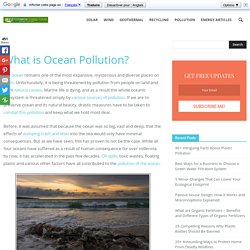
Unfortunately, it is being threatened by pollution from people on land and from natural causes. Marine life is dying, and as a result the whole oceanic ecosystem is threatened simply by various sources of pollution. If we are to preserve ocean and its natural beauty, drastic measures have to be taken to combat this pollution and keep what we hold most dear. Ocean Pollution. Stephen Palumbi: Following the mercury trail There's a tight and surprising link between the ocean's health and ours, says marine biologist Stephen Palumbi .
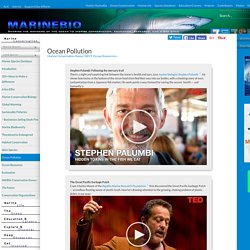
He shows how toxins at the bottom of the ocean food chain find their way into our bodies, with a shocking story of toxic contamination from a Japanese fish market. His work points a way forward for saving the oceans' health — and humanity's: The Great Pacific Garbage PatchCapt. Don't use straws. Worried about that giant plastic patch the size of Texas that's floating in the Pacific Ocean?
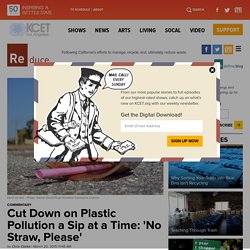
Your beverage habits might well be part of the problem. Americans use a mind-boggling 500 million single-use straws a day, according to manufacturers, and that figure doesn't include the little straws that come packaged with juice-boxes and similar containers. Laid end to end, they'd circle the earth almost two and a half times. That's 180 billion straws used each year in the United States --- most of them used for just a few minutes and then discarded -- 34 thousand tons of plastic used once and thrown away each year.
And almost none of those straws are actually necessary. Don't get me wrong: drinking straws are great for a number of different kinds of situations. But think about it. And yet most of us use them every day. Those single-use deals aren't even necessary for those of us who need to use a drinking straw. You can also find compostable drinking straws made of paper or special plastic. Stop pollution. Eight million tonnes.

That’s how much plastic we’re tossing into the oceans every year! University of Georgia environmental engineer Jenna Jambeck says it’s enough to line up five grocery bags of trash on every foot of coastline in the world. A study published by Jambeck and colleagues in the journal Science on Feb. 12 examined how 192 coastal countries disposed of plastic waste in 2010.
The report, Plastic waste inputs from land into the ocean, estimates that of 275 million tonnes of plastic generated, about eight million (based on a midpoint estimate of 4.8 million to 12.7 million tonnes) ends up in the seas—blown from garbage dumps into rivers and estuaries, discarded on beaches or along coastlines and carried to the oceans. China tops the list of 20 countries responsible for 83 percent of “mismanaged plastic” in the oceans, sending between 1.32 and 3.53 million tonnes into the seas. Plastic is everywhere in our seas. Solutions to Stop Ocean Pollution. We often hear of the causes of environmental issues, but do you know some solutions for ocean pollution?
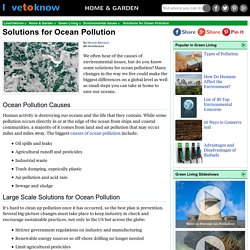
Many changes in the way we live could make the biggest differences on a global level as well as small steps you can take at home to save our oceans. World Merit * - Why Should We Care About Pollution? I see in most parts of the world today, its summer time, YAY!
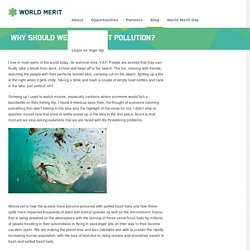
People are excited that they can finally take a break from work, school and head off to the beach. The fun, relaxing with friends, watching the people with their perfectly tanned skin, camping out on the beach, lighting up a fire in the night when it gets chilly, having a drink and trash a couple of empty beer bottles and cans in the lake, just perfect, uh? Growing up I used to watch movies, especially cartoons where someone would fish a boot/bottle on their fishing trip.
I found it hilarious back then, the thought of someone catching something that didn’t belong in the lake was the highlight of the show for me. I didn’t stop to question myself how that shoe or bottle ended up in the lake in the first place. Worse yet is how the oceans have become poisoned with spilled fossil fuels and how those spills have impacted thousands of plant and animal species as well as the environment. Acidic Oceans: Why Should We Care? - Perspectives on Ocean Science. How to Help Prevent Damage to Our Oceans: 10 Steps. Edit Article Our oceans are a place of great beauty, incredible wonders, amazing mystery, and even a source of some of our deepest fears or thrills.
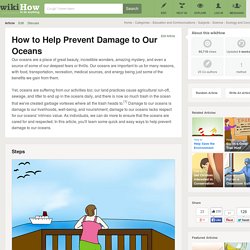
Our oceans are important to us for many reasons, with food, transportation, recreation, medical sources, and energy being just some of the benefits we gain from them. Yet, oceans are suffering from our activities too; our land practices cause agricultural run-off, sewage, and litter to end up in the oceans daily, and there is now so much trash in the ocean that we've created garbage vortexes where all the trash heads to.[1] Damage to our oceans is damage to our livelihoods, well-being, and nourishment; damage to our oceans lacks respect for our oceans' intrinsic value.
As individuals, we can do more to ensure that the oceans are cared for and respected. In this article, you'll learn some quick and easy ways to help prevent damage to our oceans. Ad Steps 1Start by learning what you can about the oceans. We could really use your help! Vans shoes. How to Do Your Part to Prevent Ocean Pollution: 7 Steps. Plastic Pollution in Oceans. Environmental Issues > Oceans Main Page > All Oceans Documents.
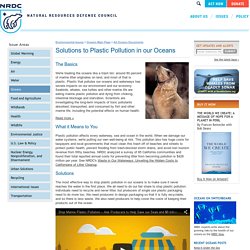
What is the biggest source of pollution in the ocean? Eighty percent of pollution to the marine environment comes from the land.
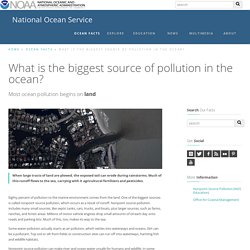
One of the biggest sources is called nonpoint source pollution, which occurs as a result of runoff. Nonpoint source pollution includes many small sources, like septic tanks, cars, trucks, and boats, plus larger sources, such as farms, ranches, and forest areas. Millions of motor vehicle engines drop small amounts of oil each day onto roads and parking lots.